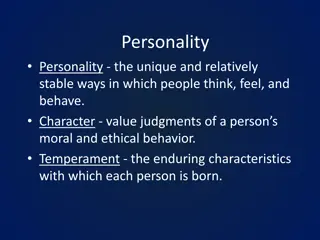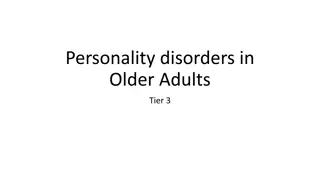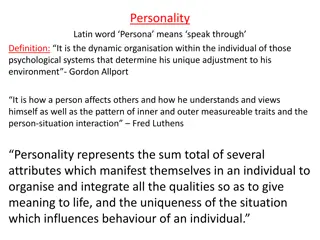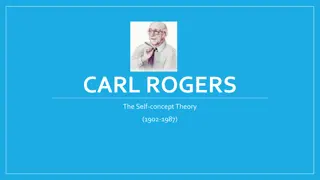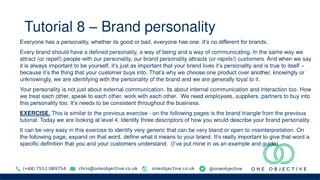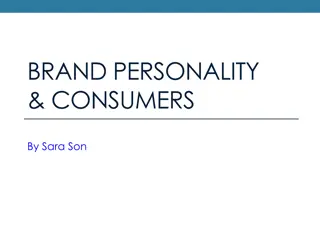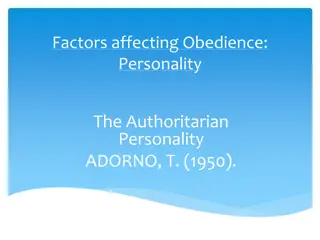Understanding Brand Personality and Self-Congruity Theory
Brand Personality is the set of human characteristics associated with a brand, enduring and stable traits that consumers attribute to products. It is a way to differentiate brands from competitors and is developed through scales that measure dimensions like sincerity, excitement, competence, sophistication, and ruggedness. Self-Congruity Theory explains that people prefer brands matching their personality traits, whether actual or ideal, like sincerity, excitement, competence, sophistication, or ruggedness.
Uploaded on Sep 29, 2024 | 0 Views
Download Presentation

Please find below an Image/Link to download the presentation.
The content on the website is provided AS IS for your information and personal use only. It may not be sold, licensed, or shared on other websites without obtaining consent from the author. Download presentation by click this link. If you encounter any issues during the download, it is possible that the publisher has removed the file from their server.
E N D
Presentation Transcript
1 = not at all descriptive 5 = very descriptive Trait Adjectives 1 2 3 4 5 Domestic, honest, genuine, cheerful Daring, spirited, imaginative, up-to-date Reliable, responsible, dependable, efficient Glamorous, pretentious, charming, romantic Tough, strong, outdoorsy, rugged
Brand Personality (Aaker, 1997) the set of human characteristics associated with a brand Brand Personality is an enduring and stable trait Consumers attribute the same personality traits to products over time and across situations
A way to differentiate brands from competitors
Scale Development (Aaker, 1997) Study 1: Generated 114 Personality Traits from: Big Five measures Participants free listing adjectives that described brand names from a variety of product categories (e.g., jeans, cars, electronics, cologne) Study 2: participants rated 40 brands on these 114 personality traits. Factor analysis reduced these 114 traits to 5 brand personality dimensions.
5 Dimensions of Brand Personality Dimension Sincerity Excitement Competence Sophistication Ruggedness Trait Adjectives Domestic, honest, genuine, cheerful Daring, spirited, imaginative, up-to-date Reliable, responsible, dependable, efficient Glamorous, pretentious, charming, romantic Tough, strong, outdoorsy, rugged Excitement Sincerity Competence Sophistication Ruggedness
Self-Congruity Theory Self-Congruity Theory (Dolich, 1969): people prefer and buy brands that match their own personality May be that certain brand personality dimensions match actual personality Sincerity = Agreeableness Excitement = Extraversion Competence = Conscientiousness May be that other brand personality match ideal personality Sophistication = upper-class, glamorous, sexy brands (e.g., Mercedes, MAC) Ruggedness = American ideals of Western, strength, Masculinity (e.g., Harley-Davidson, CoverGirl)
Self-Congruity Theory Undergraduate participants completed Big Five and Brand Personality measures Rated their preference for each type of brand personality. Brand Personality Trusted Characteristics Trusted, reliable, persevering Creative, friendly, outgoing Active, adventurous, cool Simple, caring Consumer Personality C, N Sociable A,OE Exciting E Sincere A (Mulyanegara, Tsarenko, & Anderson, 2009)
Self-Congruity Theory Brand Personality Characteristics Consumer Personality C, N Finding Trusted, reliable, persevering Creative, friendly, outgoing Active, adventurous, cool Simple, caring Trusted +C +N A,OE Sociable +E +OE E A Exciting Sincere No correlations No correlations (Mulyanegara, Tsarenko, & Anderson, 2009)
Self-Congruity Theory: Gender Differences Preference for Trusted brands: Women high in C Men high in N Preference for Sociable brands Women high in OE Men high in E Preference for Sincere brands Women low in E (high in Introversion) Men high in OE (Mulyanegara, Tsarenko, & Anderson, 2009)
Self-Congruity Theory Partially Correct Participants preferred brands (trusted, sociable) that matched their own consumer personality for C, N, and OE. Gender differences show men and women select brands to express different aspects of their personality. Suggests that consumers select brands that match their actual personality (Mulyanegara, Tsarenko, & Anderson, 2009)
Causes of Brand Personality: How can companies manipulate brand personality? Personality of company s CEO and employees Personality of brand endorsers (i.e., celebrities) Others: logos, price, distribution channel, shapes, colors
How can brands manipulate personality? Undergraduate students viewed online advertisement for a watch. Randomly assigned to view ad with watch in one of six color conditions Color Condition Red Blue Green Personality Traits Dominant, passionate, arousing Subduing, melancholy, contemplative, confident, stable, secure Refreshment, naturalness, tranquility, peacefulness, growth, health, stability, calm, and sincerity Dignified, pompous, mournful, and mystic, wealth, wisdom Cheerful, joyous, happy, optimistic, inspiring, sociable, friendly, Powerful, strong, and masterful, sophisticated Purple Yellow Black Then, rated the product along 5 brand personality dimensions (Sung & Kim, 2013)
How can brands manipulate personality? Brand Personality High level of brand personality Yellow Yellow and Red Red and Black No effect of color Yellow and Red Low level of brand personality Black Purple and Black Purple No effect of color Purple Sincerity Exciting Competence Sophistication Ruggedness Yellow (cheerful, exciting) conveys Sincerity and Exciting brand personality Red (passionate, dominant) conveys Competence, Exciting and Ruggedness brand personality Black (powerful, strong) conveys Competence brand personality All colors convey Sophisticated brand personality (Sung & Kim, 2013)
Outcomes of Brand Personality Match between brand and consumer personality: More favorable brand attitudes, greater brand trust and affect, greater brand loyalty Outcomes vary by brand personality dimension Sincerity and Ruggedness determine brand trust Excitement and Sophistication determine brand affect Competence determines both brand trust and affect
A way to differentiate brand from competitors Penn State Promo University of Michigan Ohio State University Texas Tech University University of Virginia Columbia University


